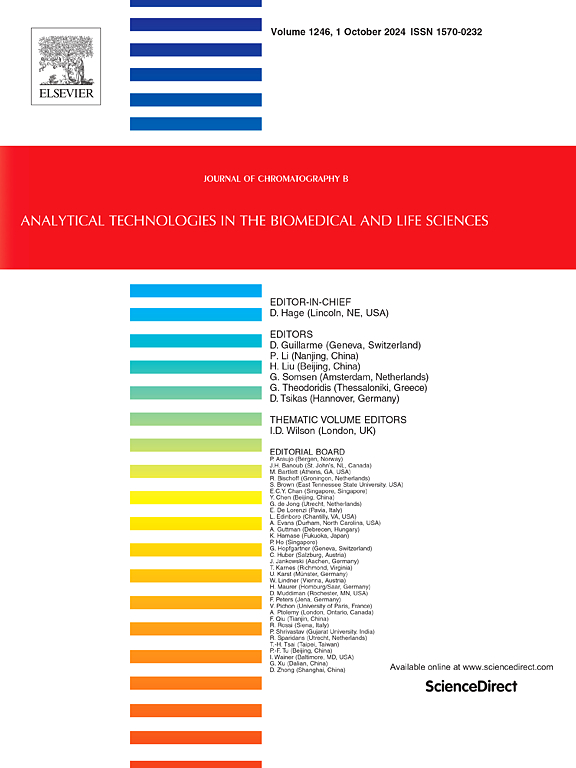利用超高效液相色谱-质谱法量化具有工业重要性的微生物(酿酒酵母)的扩展能量代谢组
IF 2.8
3区 医学
Q2 BIOCHEMICAL RESEARCH METHODS
引用次数: 0
摘要
本研究开发了一种新的定向方法,用于在单一分析样品中分离、检测和定量具有重要工业价值的微生物(如酿酒酵母)能量代谢组中的代谢物。这是利用 HILIC 模式下的超高效液相色谱-质谱技术实现的。代谢物烟酰胺腺嘌呤二核苷酸(NAD)、烟酰胺腺嘌呤二核苷酸还原型(NADH)、烟酰胺腺嘌呤二核苷酸磷酸酯(NADP)、烟酰胺腺嘌呤二核苷酸磷酸酯还原型(NADPH)的绝对浓度、黄素腺嘌呤二核苷酸 (FAD)、腺苷单磷酸 (AMP)、腺苷二磷酸 (ADP) 和腺苷三磷酸 (ATP)。通过对 0.1 至 100 µMol 的标准样品进行回归校准,所有代谢物的相关系数均达到 r2 = >0.98,从而证明了该方法的快速、统计稳健性和可重复性。所使用的样品制备、提取和分析方法显示出很高的准确度、灵敏度和回收率。在单个样品和分析运行中对更广泛的能量代谢中的代谢物进行有针对性的分析时,LOD 和 LOQ 最低为 0.055 nMol (±0.002),LOQ 最低为 0.167 nMol (±0.006)。然后将此方法应用于酿酒酵母细胞培养,以评估该方法在工业微生物培养中的应用。通过使用氚标记和同位素标记的内标 AMP-15N、ADP-15N 和 ATP-d14 进行回收分析,统计确定所获得的结果是可靠和可重现的。本文章由计算机程序翻译,如有差异,请以英文原文为准。
Quantifying the extended energy metabolome of industrially important microorganisms (Saccharomyces cerevisiae) using ultra-performance liquid chromatography with mass spectrometry
This study has developed a new targeted methodology for the separation, detection, and quantification of metabolites from the wider energy metabolome of industrially important microorganisms such as Saccharomyces cerevisiae in a single analytical sample. This has been achieved using UHPLC-MS technology in HILIC mode. Absolute concentrations of metabolites nicotinamide adenine dinucleotide (NAD), nicotinamide adenine dinucleotide reduced (NADH), nicotinamide adenine dinucleotide phosphate (NADP), nicotinamide adenine dinucleotide phosphate reduced (NADPH), flavin adenine dinucleotide (FAD), adenosine-monophosphate (AMP), adenosine-diphosphate (ADP), and adenosine-triphosphate (ATP) were determined in a single extraction and analytical methodology.
This study demonstrated the development of a rapid, statistically robust, and reproducible methodology through regression calibrations of standard samples from 0.1 to 100 µMol providing a correlation value of r2 = >0.98 for all metabolites. Sample preparation, extraction and analytical methodologies used showed high accuracy, sensitivity, and recovery. With an LOD and LOQ for the targeted analysis of metabolites from the wider energy metabolism in a single sample and analytical run with the lowest LOD of 0.055 nMol (±0.002) and lowest LOQ of 0.167 nMol (±0.006). This method was then applied to Saccharomyces cerevisiae cell culture to evaluate the methodology in industrially used microbial cultures. Results obtained have been statistically determined to be robust and reproducible through recovery analysis using deuterated and isotopically labelled internal standards AMP-15N, ADP-15N and ATP-d14.
求助全文
通过发布文献求助,成功后即可免费获取论文全文。
去求助
来源期刊

Journal of Chromatography B
医学-分析化学
CiteScore
5.60
自引率
3.30%
发文量
306
审稿时长
44 days
期刊介绍:
The Journal of Chromatography B publishes papers on developments in separation science relevant to biology and biomedical research including both fundamental advances and applications. Analytical techniques which may be considered include the various facets of chromatography, electrophoresis and related methods, affinity and immunoaffinity-based methodologies, hyphenated and other multi-dimensional techniques, and microanalytical approaches. The journal also considers articles reporting developments in sample preparation, detection techniques including mass spectrometry, and data handling and analysis.
Developments related to preparative separations for the isolation and purification of components of biological systems may be published, including chromatographic and electrophoretic methods, affinity separations, field flow fractionation and other preparative approaches.
Applications to the analysis of biological systems and samples will be considered when the analytical science contains a significant element of novelty, e.g. a new approach to the separation of a compound, novel combination of analytical techniques, or significantly improved analytical performance.
 求助内容:
求助内容: 应助结果提醒方式:
应助结果提醒方式:


